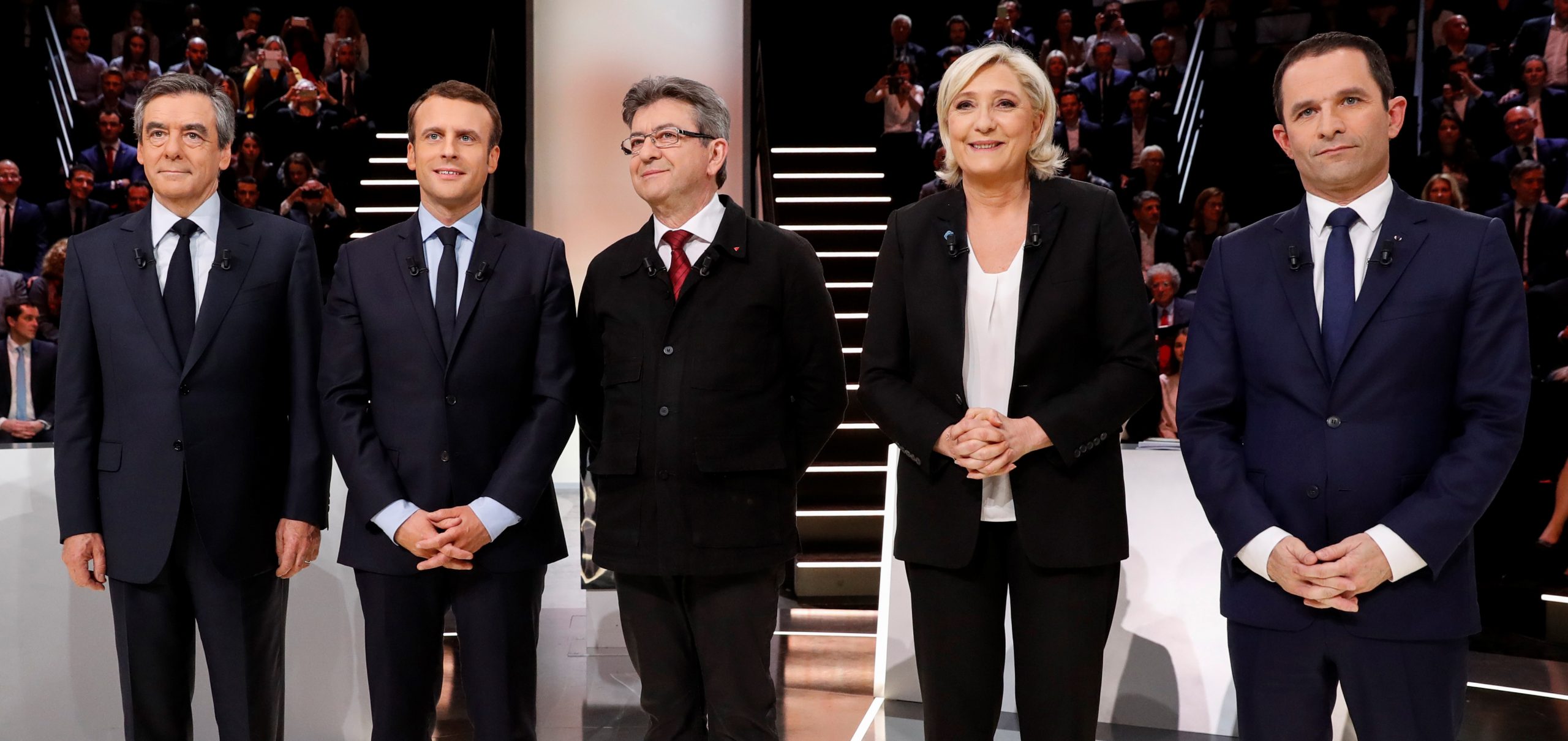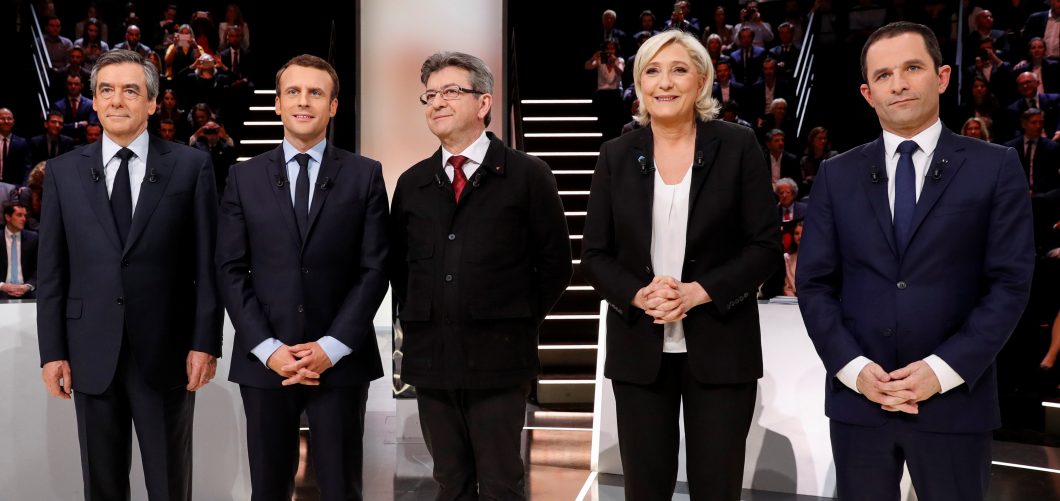Free-for-All in France, Part Two

(LtoR) French presidential election candidates, Les Republicains (LR) party Francois Fillon, En Marche ! movement Emmanuel Macron, La France insoumise Jean-Luc Melenchon, Front National (FN) party Marine Le Pen, and French Socialist (PS) party Benoit Hamon, pose before a debate on March 20, 2017. (PATRICK KOVARIK/AFP/Getty Images)
The race for the presidency of France seems to have been scripted by our television news channels—which is bad news for democracy, whose natural ground is common sense. Every week gives us a mass of news, reversing that of the week before. This is by way of telling readers that what I write today could easily be wrong tomorrow. And as I’ve mentioned before on this site, a variety of outcomes are still possible, even as the first round of the election approaches in April.
Let’s try to tell the firm facts, in any case.
The right-wing primary elections yielded François Fillon (former prime minister) as one candidate; the left-wing primaries elections made the unexpected choice of Benoît Hamon (former minister of education). These primaries were essentially a way to “fire” prominent politicians: Nicolas Sarkozy and Alain Juppé on the Right, Manuel Valls on the Left, and of course the incumbent Socialist President François Hollande, unable to run for a new mandate because of his unpopularity.
But the primaries represented only part of the political debate. At least two left-wing candidates who are still in the race have healthier poll numbers than the Socialist Hamon: former Socialist Jean-Luc Mélenchon, supported by the Communist Party, and above all Emmanuel Macron, former economy minister and close collaborator of Hollande, defending a center-left policy, and gathering supporters from the center-left and center-right (especially the centrist François Bayrou of the Democratic Movement, who had supported Hollande against Nicolas Sarkozy back in 2012). Macron also has the backing of Robert Hue, former leader of the Communist Party, and of Daniel Cohn-Bendit, representative of the aging student-revolutionaries of 1968.
The polls, that is to say, give a large advance to Macron, who is predicted to place in the top three in April’s first-round vote. On the other hand, these polls should be taken with a grain of salt; Macron’s supporters may still be shopping around.
On the Right, Marine Le Pen, head of the populist Front National, was not in the primaries but leads all other presidential candidates in the polls at this point.
What makes the campaign wilder is the judicial interference and the prosecution of some of these personalities in the media. Fillon and Le Pen are being attacked harshly but nobody can say if the attacks will stick. In terms of legal cases, both are supposed to have illicitly passed state funds to people close to them (Fillon to his wife, Le Pen to her chief of staff). The two sagas advance constantly, with a new “revelation” just about every week. Some of the revelations aren’t too revelatory (have been known about, and reported about in the past). Several are trumped up. But they do distract the French public from the issues, which may be the point.
Emmanuel Macron, the media favorite, who has no precise program and who does not speak too precisely about what he would do if elected—wise, in view of his need to maximize his appeal to various groups—is enjoying this situation greatly. The press likes him so much that it was estimated that, during the month of February, the main information television channel, BFM TV, showed as many hours of Macron’s meetings as Le Pen’s, Fillon’s, Hamon’s, and Mélenchon’s put together.
The judicial agenda—exploited by French journalists, who enjoy illegal access to the secrets of the investigations—is a way to undermine the legitimacy of the right-wing candidates, to hamper their election prospects or prevent them from carrying out their program if either should win. It is not a very efficient strategy against Marine Le Pen: Her supporters are sure that the political “establishment” will do everything to prevent her election. So every judicial or journalistic attack enables her, on the contrary, to progress in the polls.
But this strategy is efficient against François Fillon. Many of his strongest supporters abandoned him early this month, calling for a new candidate and ignoring the primary results. However, a heavily attended demonstration of the conservative movement in Paris at that time blasted the manipulations of the courts and the press, shoring up the legitimacy of the Fillon candidacy.
Afterward, Fillon reached out to the politicians who have betrayed and insulted him, and offered them a great political deal: The liberal wing of the Republican Party and the centrist party were welcomed, with new ideological guidelines for the campaign and, most importantly, the promised apportionment of several parliamentary seats (the legislative election will take place a month after the presidential one)—meaning that some core conservative supporters of François Fillon were “killed” to welcome these liberals.
Whereupon Fillon’s new “allies” became more and more greedy, demanding that he purge some key people from his campaign team (like the former conservative minister of defense, Charles Millon). And at the same time, other centrists were still abandoning Fillon to join Macron, letting everybody see how politically reliable they are (not very). Fillon, for his part, seems to have opened his eyes: Last week, he refused to fire his social networks director Samuel Lafont, who is known as an activist in the anti-gay marriage group La Manif Pour Tous (“The Protest for Everyone”), and is a target of LGBT activists.
Anyway, the strangeness of this campaign continues, with the liberal candidate Macron trying to recruit right-wing supporters and refusing the support of Socialist congressmen to try to distance himself from the unpopular sitting government. Meanwhile the right-wing candidate Fillon tries to keep his leftist supporters, taking some of the more faithful conservatives for granted. The only candidates pursuing a coherent campaign are considered to have less chance of being elected: Mélenchon and Hamon are retailing a very old-fashioned communist message, and Marine Le Pen is coming back to the core principles of the Front National, especially a feisty critique of the establishment and opposition to massive immigration.
Through the fog can be seen (in blurry outline, to be sure) a possible victory by Macron, or Fillon, or Le Pen. This crazy campaign is really a good movie!



